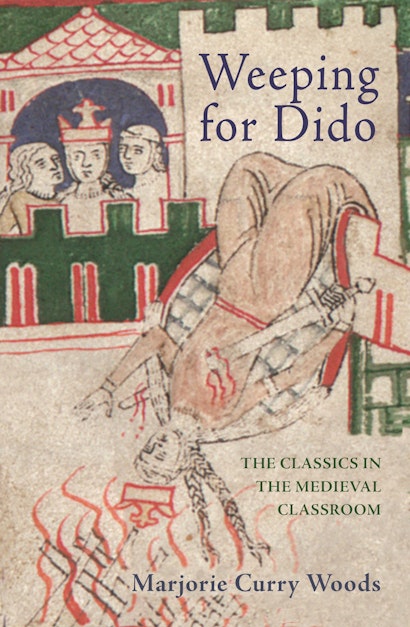Saint Augustine famously “wept for Dido, who killed herself by the sword,” and many later medieval schoolboys were taught to respond in similarly emotional ways to the pain of female characters in Virgil’s Aeneid and other classical texts. In Weeping for Dido, Marjorie Curry Woods takes readers into the medieval classroom, where boys identified with Dido, where teachers turned an unfinished classical poem into a bildungsroman about young Achilles, and where students not only studied but performed classical works.
Woods opens the classroom door by examining teachers’ notes and marginal commentary in manuscripts of the Aeneid and two short verse narratives: the Achilleid of Statius and the Ilias latina, a Latin epitome of Homer’s Iliad. She focuses on interlinear glosses—individual words and short phrases written above lines of text that elucidate grammar, syntax, and vocabulary, but that also indicate how students engaged with the feelings and motivations of characters. Interlinear and marginal glosses, which were the foundation of the medieval classroom study of classical literature, reveal that in learning the Aeneid, boys studied and empathized with the feelings of female characters; that the unfinished Achilleid was restructured into a complete narrative showing young Achilles mirroring his mentors, including his mother, Thetis; and that the Ilias latina offered boys a condensed version of the Iliad focusing on the deaths of young men. Manuscript evidence even indicates how specific passages could be performed.
The result is a groundbreaking study that provides a surprising new picture of medieval education and writes a new chapter in the reception history of classical literature.
Marjorie Curry Woods is the Jane and Roland Blumberg Centennial Professor of English, Professor of Comparative Literature, and University Distinguished Teaching Professor at the University of Texas at Austin. She is the author of An Early Commentary on the “Poetria nova” of Geoffrey of Vinsauf and Classroom Commentaries: Teaching the “Poetria nova” across Medieval and Renaissance Europe.
"This book will be of vital interest to scholars of medieval education. Classicists interested in the medieval reception of classical texts will also find it fascinating."—Rachel Moss, Times Higher Education
"[A] book that is more than a stunning work of scholarship—it is an immersive experience that transports the reader
across space and time into the sounds and fury of women in the medieval classroom."—Alex Mueller, Studies in the Age of Chaucer
“Weeping for Dido is an important, groundbreaking book that shows that classical Latin texts were as foundational as biblical ones in medieval elementary classrooms and were copiously learned by boys throughout Europe, despite or indeed because of their ancient heroic content and frequent focus on women wronged by men. This book should appeal to a broad audience of scholars interested in oral-literate cultures, medieval and early modern education, the classical tradition, rhetoric, early humanism and Renaissance literature, and the history of the book.”—Mary Carruthers, New York University
“Examining medieval manuscripts that have not been extensively studied by others, Marjorie Curry Woods, one of the leading authorities in the field, makes an important intervention in a number of areas: the study of the reception of canonical texts through commentaries, glosses, and marginalia; the history of education and of emotions; and the place of performance in a heavily textual culture. Weeping for Dido’s contributions to these subjects will ensure it a readership beyond medievalists and manuscript experts.”—Philip Hardie, University of Cambridge
“Marjorie Curry Woods brings to life the experience of learning in the medieval classroom through her careful, imaginative interpretation of manuscript glosses and her analysis of schoolboys’ participation in the emotions of fictional female characters.”—Peter Mack, author of Rhetoric's Questions

